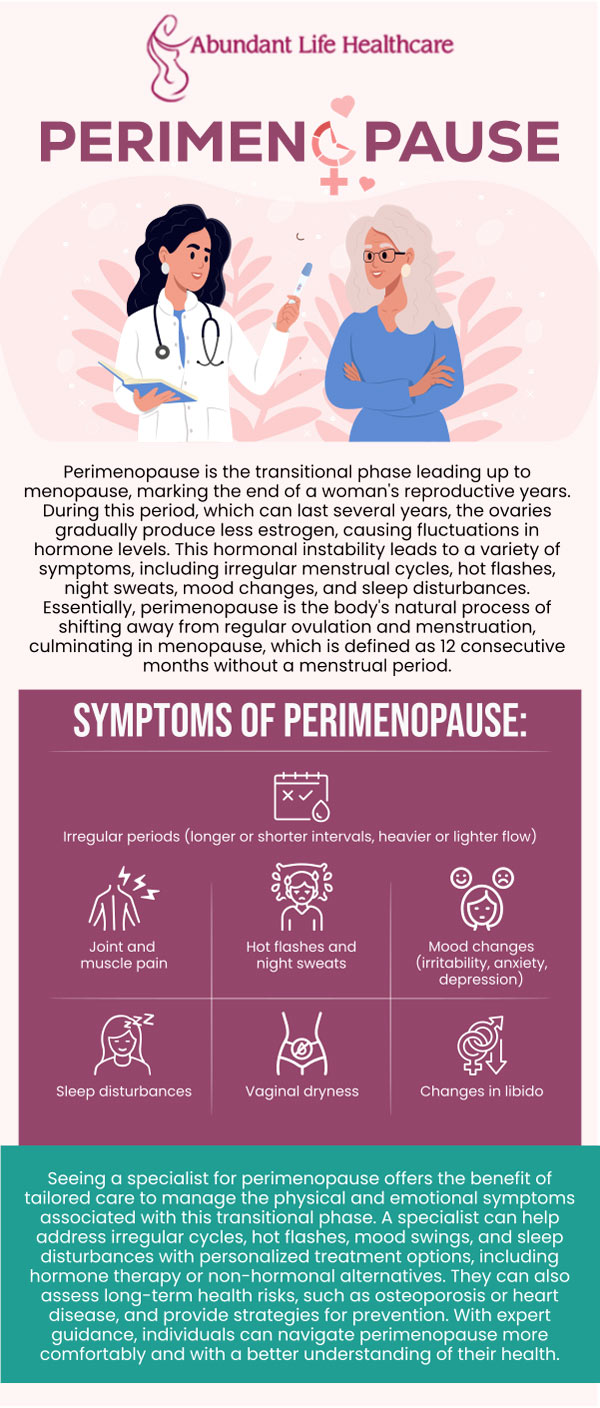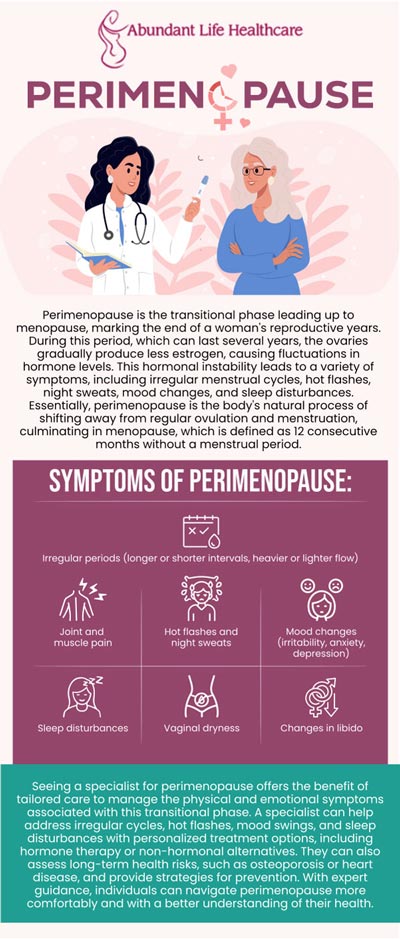Perimenopause Treatment Specialist in Lawrenceville, GA
Perimenopause is a phase that occurs before your final menstrual cycle. During this time, your ovaries gradually reduce their activity, which can cause fluctuations in the production of estrogen and progesterone. As a result, your periods may become irregular, and you may experience symptoms like hot flashes, mood swings, and vaginal dryness. If you’re dealing with perimenopausal symptoms, Dr. Marc Jean-Gilles, DO, FACOG at Abundant Life Healthcare can assist you with hormonal shifts and effective treatment options. For more information, contact us today or book an appointment online. We are conveniently located at 601A Professional Drive, Suite 370, Lawrenceville, GA 30046.




Table of Contents:
What are the first signs of perimenopause?
What is perimenopause age?
What are the two stages of perimenopause?
What is the difference between perimenopause and premenopause?
Perimenopause, the transitional phase before menopause, brings several signs and symptoms that indicate hormonal changes. Here are some of the first signs to look out for:
• Irregular periods – Menstrual cycles often become shorter or longer. Additionally, the flow may fluctuate.
• Hot flashes – Perimenopause can cause sudden waves of heat and sweating, often accompanied by a rapid heartbeat.
• Sleep disturbances – Difficulty falling or staying asleep, night sweats, or waking up feeling unrested can be attributed to perimenopause.
• Mood swings – This phase can bring about fluctuations in mood, ranging from irritability to sadness.
• Vaginal changes – Dryness and discomfort during intercourse can arise due to declining estrogen levels.
• Decreased fertility – As ovulation becomes irregular, conceiving will be more challenging.
• Changes in libido – Perimenopause can cause a decrease or fluctuation in sexual desire.
• Fatigue – This phase can leave you feeling tired or experiencing lower energy levels.
• Breast tenderness – Sensitivity or discomfort in the breasts is common during perimenopause.
The age of perimenopause varies for each woman, but it typically starts in the late 30s to early 40s. This marks the transitional phase leading up to menopause, which is the point when menstrual periods stop completely. On average, women reach menopause around 50. However, the perimenopause stage can last anywhere from a few months to several years.
During perimenopause, hormone levels, specifically estrogen, and progesterone, start to fluctuate, leading to various physical and emotional changes. Irregular menstrual cycles are one of the primary indicators of perimenopause, along with symptoms such as hot flashes, mood swings, sleep disturbances, and vaginal dryness.
Perimenopause is a natural part of a woman’s reproductive journey, so the age of onset can be influenced by factors such as genetics, lifestyle, and overall health. If you suspect you are experiencing perimenopause, it’s essential to consult a healthcare professional for evaluation and guidance on managing the symptoms associated with this phase of life.
Perimenopause is divided into two stages:
• Early perimenopause – This stage marks the beginning of the perimenopausal transition. Estrogen levels will start to fluctuate, leading to changes in the menstrual cycle. Periods may become irregular, either with shorter or longer cycles. Some women experience lighter or heavier bleeding during this phase. Hot flashes, night sweats, and mood swings can also begin during this stage. However, fertility is still possible, so pregnancy can occur.
• Late perimenopause – In this stage, estrogen levels continue to decline, so menstrual cycles become even more irregular. Women report experiencing more intense symptoms, such as frequent hot flashes, sleep disturbances, and vaginal dryness. Fertility declines significantly during late perimenopause, but just as in the early stage, it’s still possible to become pregnant.
The transition from perimenopause to menopause is gradual. The latter stage is officially reached when a woman has not had a menstrual period for 12 consecutive months. Understanding the stages of perimenopause allows women to better navigate this natural life phase.
Perimenopause and premenopause are two distinct phases in a woman’s reproductive cycle, each signifying different stages of the menopausal transition:
• Premenopause – Premenopause refers to the years leading up to perimenopause. During this stage, women experience regular menstrual cycles and have consistent hormone levels. Premenopause is characterized by relatively stable estrogen and progesterone levels. During this time, women are typically fertile and can conceive.
• Perimenopause – Perimenopause is the transitional phase that precedes menopause. This is a period when hormonal fluctuations become more pronounced, so women often start experiencing irregular menstrual cycles. Estrogen levels fluctuate which results in symptoms such as hot flashes, night sweats, mood swings, and changes in menstrual flow. Fertility declines during perimenopause, but it is still possible to conceive successfully in some cases.
In summary, premenopause is the phase of reproductive life with stable hormonal levels and regular menstrual cycles, while perimenopause represents the transition towards menopause with hormonal fluctuations and irregular periods.
Perimenopause Treatment Specialist is available at Abundant Life Healthcare. For more information, contact us today or book an appointment online. We are conveniently located at 601A Professional Drive, Suite 370, Lawrenceville, GA 30046. We serve patients from Lawrenceville GA, Suwanee GA, Snellville GA, Duluth GA, Dacula GA, Lilburn GA, Loganville GA, Auburn GA, and surrounding areas.
Check Out Our 5 Star Reviews


Additional Services You May Like

Additional Services You May Like
- Obstetrics
- Pregnancy
- Gynecologist
- Birth Control
- Labiaplasty
- Microblading
- Weight Loss
- Semaglutide GLP-1
- Pap Smears
- Pelvic Pain
- Laser Hair Removal
- In House Ultrasound (Including 3D)
- Vaginal Birth After C-Section (VBAC)
- Pregnancy As High Risk
- Multiple Gestations
- Postpartum Counseling
- 24hour/365days On Call Service
- Annual Exam
- Abnormal Uterine Bleeding
- Management Of Endometriosis
- Ultrasound
- Pelvic Organ Prolapse
- Urinary Incontinence
- Perimenopause And Menopause
- Sexual Dysfunction
- Fat Freeze (Like Cool Sculpting)
- Body Contouring
- Ozempic
- Civil Surgeon
- Hormone Replacement Therapy
- Immigration Medicine
- Biote Hormone Pellets
- GLP-1
- Peptide Therapy




